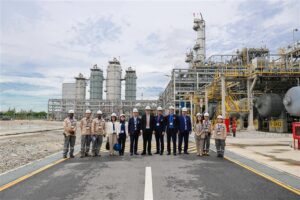Cariflex Pte. Ltd. (Singapore), a wholly owned subsidiary of DL Chemical Co., Ltd. (DL Chemical), officially inaugurated its new polyisoprene latex plant at Jurong Island, Singapore. With an investment of US$355 million, the plant is the largest of its kind globally and will significantly expand Cariflex’s production capacity to meet growing demand for high-quality synthetic latex used in medical and protective applications.
The inauguration ceremony was officiated by Dr Tan See Leng, Singapore’s Minister for Manpower and Second Minister for Trade and Industry. It was attended by several distinguished guests, including H.E. Hong Jin Wook, Ambassador of the Republic of Korea, Mr Kim Jong Hyun, Chief Executive Officer of DL Chemical, Mr Ryu Sang Woo, Chief Executive Officer of Cariflex, Mr Prakash Kolluri, Member of the Cariflex Board of Directors and President of the Polymer Business at Kraton, Mr Lim Wey-Len, Executive Vice President of the Singapore Economic Development Board (EDB), and Ms Christine Wong, Assistant Chief Executive Officer, Cluster Group at JTC.
Strengthening Cariflex’s Manufacturing Network
Supported by EDB and JTC, the Singapore facility plays a key role in Cariflex’s ability to serve Southeast Asia, home to critical manufacturing sites for surgical gloves and condoms. Spanning 6.1 hectares, this plant supports growing demand in these markets as well as others such as non-surgical medical gloves, adhesives, and laminates, further broadening the company’s diversification. Over the past two decades, Cariflex has expanded its manufacturing capacity in Brazil and previously, Japan, including a US$50 million expansion of its Paulinia facility in 2021.
Mr Ryu Sang Woo, Chief Executive Officer at Cariflex, said: “We have strategically located our new facility here in Singapore, at the doorstep of our key customers. Singapore’s thriving financial, innovation, and logistics hubs, along with a highly skilled workforce and strong IP protection, made this the ideal choice for our investment.
“This new facility will allow us to expand production, while providing our customers with a diverse and reliable supply of high-quality materials, reinforcing our leadership in the global polyisoprene latex market,” he added.
Construction of the plant began in 2022, with operations commencing in November 2024. The plant is designed for modular expansion to accommodate future demand growth. When fully ramped up, it will double Cariflex’s 2023 manufacturing capacity for polyisoprene latex.
Investing in Talent and Long-Term Careers
The opening of this plant also aligns Singapore’s broader push to grow high-value, innovation-driven industries that offer meaningful and inclusive job opportunities for locals.
The facility has created approximately 80 new permanent roles, the majority filled by Singaporeans. Cariflex has invested in developing its talent through training programs at its Brazil operations and at DL Chemical’s sites in Korea, with a focus on operations, safety, quality, and digital systems. These efforts support Cariflex’s long-term commitment to fostering career growth, including for non-graduates through mentorship programs.
Mr. Lim Wey-Len, Executive Vice President at the Singapore Economic Development Board, said: “This new facility reflects Cariflex’s confidence in Singapore as a gateway to serve robust regional demand for specialty chemicals and as a key supply chain node for healthcare and hygiene markets.
The plant is one of the largest investments by a Korean chemicals firm in Singapore in recent years and underscores the growing partnership between both countries. We look forward to Cariflex tapping on Singapore’s innovation ecosystem to explore new possible end applications for its products, and continue to welcome like-minded partners as EDB grows Singapore as a specialty chemicals hub.”

New facility increases Cariflex’s global manufacturing capacity, with future expansion already enabled to meet growing market demand in the foreseeable future (Source: Cariflex)
Operational Efficiency and Sustainability by Design
Cariflex’s new facility leverages Singapore’s advanced infrastructure and strong manufacturing base to deliver both operational efficiency and environmental sustainability. Located on Jurong Island’s chemical hub, the plant benefits from a plug-and-play environment with shared utilities, integrated logistics, and proximity to suppliers.
Ms Christine Wong, Assistant Chief Executive Officer, Cluster Group, JTC said: “JTC is pleased to welcome Cariflex to Jurong Island. Cariflex’s expertise in high-value, high-quality chemical products adds to the growing diversity of specialty chemicals produced on the island. We are glad that Jurong Island’s plug-and-play infrastructure has enabled more sustainable and efficient operations at Cariflex’s new plant, and we look forward to more companies tapping into our integrated ecosystem.”
The site features a Direct-Connect production model, a more sustainable approach compared to traditional methods. Unlike the non-integrated process adopted previously —where raw materials had to be transported, repackaged, and redissolved before production—the Singapore facility streamlines manufacturing, reducing carbon emissions and improving efficiency. This approach not only enhances reliability and speed-to-market but also reduces the plant’s environmental footprint, aligning with global customer expectations for sustainable and resilient supply chains.
Positioned to Meet Regional Demand
In 2020, Cariflex relocated its global headquarters to Singapore to strengthen integration between its commercial and manufacturing operations. Cariflex is the only company globally that manufactures anionic catalyst-based synthetic rubber and latex, known for its superior purity, transparency and softness. Cariflex’s polyisoprene latex is primarily used in the production of surgical gloves and condoms, with strong demand from developed markets such as the US due to its hypoallergenic properties and superior comfort compared to alternative offerings. With its expanded capacity, Cariflex can now explore new applications in medical gloves, adhesives, and laminates.